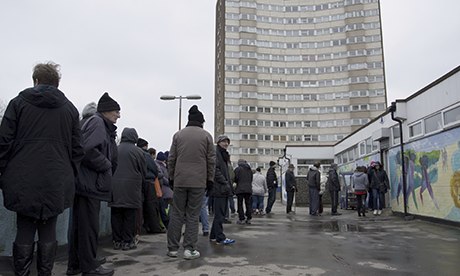by Laura Dobie
Food poverty is a social issue which has been the subject of much media attention in recent weeks. The BBC 1 Sport Relief programme, Famous, rich and hungry, in which celebrities spent time with families experiencing food poverty, while controversial in its approach, has prompted concern and discussion around those who are struggling to afford life’s essentials. Meanwhile, mid-March saw a major donation drive at Glasgow Central Station for Glasgow City Mission, whose stocks of emergency food rations were running low after a surge in demand.
In this post, we look at the growth of food poverty in the UK, the work of food banks and some interesting initiatives in this area.
Food poverty
Recent research indicates that food poverty is a growing issue in the UK. The Economic and Social Research Council project, Poverty and Social Exclusion in the UK, found that over half a million children in the UK live in families who have insufficient funds to feed them adequately, while 3.5 million adults cannot afford to eat properly. Recession-hit finances appear to be affecting food purchasing behaviour. An Institute for Fiscal Studies report found that British households have cut real expenditure on food brought into the home, reduced the amount of calories that they buy and have substituted fruit and vegetables with cheaper processed foods. Pensioner households, single parent households and households with young children are experiencing the greatest declines in the nutritional quality of foods purchased between 2005-07 and 2010-12.
Research from Barnardo’s, The real cost of living, highlighted how declining wages and increasing costs of essential goods were exerting pressure on low-income families. A recent survey of its services revealed that 45% provide food directly to families and young people, and 90% had referred families and young people to food banks in the past 12 months. 94% of those making referrals reported that the number of referrals made over the past 12 months had either remained high or increased. Factors identified by service managers as contributing to the growth in food poverty experienced by service users included the rising cost of living, cuts to levels of welfare support, delays in receiving benefits and a tougher sanctions regime and reforms to the Social Fund.
Food banks: lifelines and changing roles
Food banks provide emergency food rations to people experiencing hardship, distributing food donated by individuals and organisations to those in need. Most will only provide food to people who have been referred by frontline professionals. Recently food banks have been experiencing increasing demand for their services: the Trussell Trust saw a 170 per cent increase in the numbers of people given emergency food between 2011/12 and 2012/13 and is launching three new food banks per week to meet growing demand. The demographic profile of its service users is changing, too, with a shift away from traditional groups such as homeless people, to those experiencing benefit delays and people on low incomes.
Food banks have been criticised by some as creating dependency and tackling the symptoms, rather than the root causes of poverty. However, some are expanding their remit beyond food provision to address underlying problems. Tower Hamlets Food Bank has a housing benefits manager stationed at one of its food banks every Friday to respond to service users’ concerns in this area, and the Matthew Tree Project offers training, care and support, in addition to developing local food production networks, helping people to live rewarding and self-sufficient lives.
Other responses
There are a wealth of projects and initiatives to tackle food poverty across the UK, including food kitchens, school breakfast clubs, lunch clubs for older people and community food buying initiatives. Here are a couple of interesting examples:
FoodCycle
FoodCycle works to reduce food waste and food poverty by using surplus food, spare kitchen space and the cooking skills of volunteers to provide meals to people experiencing food poverty and social isolation. Since its establishment in May 2009 it has served over 80,000 meals, made with 85,000kg of reclaimed surplus food (the equivalent of a saving of 382,500kg in CO2 emissions) by its network of 1,200 volunteers.
Fair Food Carlisle
Fair Food Carlisle is a partnership between Sustainable Carlisle and Brampton Food Network, and it establishes links between local producers and local people to purchase good-quality, environmentally-sensitive food directly, at fair prices. It aims to strengthen local communities and the local economy by increasing the use of sustainable local produce.
Share
Related Posts
A recent item on BBC Radio 4’s Today programme generated an unusually high number of responses from listeners. A man who had lost his job in the financial services sector at the age of 57 described his difficulty in trying ....
Tackling geographical inequalities is critical for ensuring that all parts of the country have the potential to prosper. When the UK was a member of the European Union, it was entitled to a share of funding from the EU’s structural ....
By Robert Kelk and Chris Drake A new start for an old challenge? The recent appointment of Marc Lemaître as the European Commission’s director general for research and innovation (R&I) has returned Europe’s R&I gap to the spotlight. Previously head ....
Across the world, two disruptive and powerful trends are taking hold: digitalisation and decarbonisation. At times, it seems as if these two forces are acting against each other, with digital technologies accelerating economic growth, but also consuming huge quantities of ....

